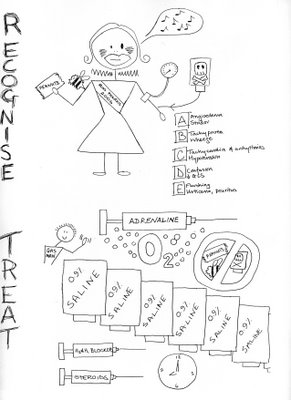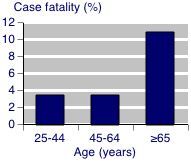Is the airway patent and protected? Guest podcast by Dr John Rutherford.
MP3 File
Sunday, December 31, 2006
Sunday, December 24, 2006
Wardround 22xii6

Merry Christmas!
Our two minute talks this week were on a favourite book/film/text, with relevence to medicine. I am pleased that this produced such an eclectic bag of goodies.
The choices were:
Jaws (Peter Benchley/Steven Spielberg): for, as Mark would have us believe, the inspiration to study shark attacks and develop a plan to manage such attacks.
The House of God (Samuel Shem): Before you walk a path, it is useful to read of those who went before. A must for all residents.
The Oxford Handbook of Clinical Medicine: A torch in the darkness (ignorance) of the first months of training. I am too old to have had one as a resident. Medical books were still in Latin back then. (Abite in malum rem).
My Sister’s Keeper (Jodi Picoult): for the ethical dilemmas. (A Richard and Judy recommendation, no less...so says Mrs Wardround).
Good Bye Lenin (Dir W Becker): truth and deception. Can deception, with the best of intentions, be right?
Scrubs: be presented with medical/ethical dilemmas disguised as comedy. Use as an aid when reflecting on your own actions and decisions...or those of others.
M*A*S*H: ditto.
MJM
Sunday, December 17, 2006
Wardround 15xii6

This week’s two minute talks were about emergencies: I have uploaded Dr Gunn’s summary sheet for anaphylaxis since it so impressed me.
A general learning point for all the emergencies is the need to consider the practicalities as well as the treatment. So get help quickly and put people to use as they show up (e.g. “put a line in the right arm, please”...”go and read the case notes”...”call the ITU consultant” etc). Know the doses of drugs you might need to use urgently. All the emergencies require the usual attention to ABCDE.
Sudden loss of consciousness (MR): get help, ABCDE, remember BM, rashes, OD.
Hypoglycaemia (MR): get help, ABCDE, remember unusual presentations: LOC, fits, TIA, blindness, apparently drunk. Be aware especially in those with chronic liver disease.
Anaphylaxis: get help, ABCDE, lots of fluids, oxygen, adrenaline, chlorpheniramine, steroids. 3mg of adrenaline is 3mls of 1:1000.
For next week’s talks we would like two minutes on your favourite book or film. The only caveat is that it must have a medical connection.
The paper for discussion on Tuesday is A field guide to experts.
Andrew D Oxman, Iain Chalmers, Alessandro Liberati.
BMJ 2004;329:1460-1463
Interesting topics
Pyrophosphate arthropathy
RS3PE
MJM
Sunday, December 10, 2006
Wardround 8xii6

This week’s theme for two minute talks was Adverse Drug Reactions. ADRs are not uncommon and are sometimes fatal. Drug induced agranulocytosis mortality is shown in the figure. Even when an ADR is recognised, its presence may not be flagged up in the final diagnosis and the opportunity to prevent a repeat episode can be lost. When did you last write “Adverse Drug Reaction” in the diagnostic list?
In the talks we heard about:
Non-drug reactions (SS): the importance of asking patients if they are using non-prescribed remedies, the effects of food on drug activity such as pectins/digoxin and broccoli/warfarin.
Prevention (TJ): be aware of interactions with drugs you commonly use and check for interactions when the drug is unusual or has a narrow therapeutic window.
Diagnosis (HG)**: always consider ADR in your differential diagnoses. Be clear about information gathered and consider risk factors.
Warfarin and Antibiotics (RT): always check for interactions and monitor INR daily if interaction is expected. And of course, the second rule of ID, always ask yourself if the antibiotic is really needed.
Penicillins (AM): identify true allergy. Give some thought to the common situation of a patient reporting allergy to an antibiotic but not recalling which one. When you last prescribed an antibiotic did you tell the patient which one it was...or did you say “we’re giving you an antibiotic/a different antibiotic”
Amiodarone (MR): a bit of an aside here...MR, fight your corner, argue for your patient and don’t give in.
**=best talk
I was at a conference recently where one of the speakers had a paroxysm of acronymophilia while talking about ADRs. You will tell from the example that the example was an immunosuppressive agent.
S...Stratify: is the patient at higher risk of an ADR: comorbidities, drugs, age.
A...Assess: Hepatitis status, TB risk, vaccinations up to date?
F...Fend-off: vaccinate, optimise health (stop smoking etc).
E...Evaluate: check what ADRs might be expected, look for them.
T...Treat: nip it in the bud (UTI is easier to treat than septic multi-organ failure).
Y...Yearly: re-evaluate all of the above regularly. The frequency depends on the drug.
I have been contacted by EM from pharmacy, who has asked me to remind everyone about the risk of using ciprofloxacin in patients with epilepsy. And I will take the opportunity to mention the risk of ciprofloxacin in patients with tendonopathy (especially if on steroids). From a more general point of view we discussed the possibility of having a red dot system, similar to that used by radiographers, for the drug kardex. What do you think?
Next week’s two minute talks are on the OMG emergencies. We want to know the practical immediate management of:
Anaphylaxis (HG)
Hyperkalaemia (RT)
Sudden loss of consciousness (MR)
Hypoglycaemia (MR)
Sudden hypotension (TJ)
Sudden hypoxia (DK)
Two minutes please. Keep it concise yet precise and quote your sources. Can we make the handouts a visual aid? We don’t really need the talk written out.
The cardinal paper will be carried over once more...discussion on Tuesday as suggested by HG.
Interesting topics
Mitral regurgitation
ADR Agranulocytosis
Benign intracranial hypertension or alternatively
MJM
Saturday, December 09, 2006
Suspected PE
MP3 File
British Thoracic Society guidelines for the management of suspected acute pulmonary embolism. Thorax 2003;58:470–484
Friday, December 01, 2006
Wardround 1xii6
This week’s two minute talk theme was common investigations. We heard about:
Rheumatoid factor (MJM): present in many inflammatory and infectious illnesses, more useful as a prognostic marker than in diagnosis, and a possible cause of interfernce with immunoassays.
D-dimer (PL) the physician’s bain – thought of as a “rule-out DVT test” by many but actually more of a “profiling the risk of DVT test”, has little practical application in patients who already have high pre-test probability of DVT.
Bilirubin (TJ) measurement may be influenced by food intake.
Glucose (AB): remember that venous and capillary samples give different results by as much as 1 mmol/l. Always get a lab sample at the extremes of results or where hypoglycaemia is suspected in a non-diabetic patient.
Troponin (HG): Excellent talk Dr Gunn: useful prognostic marker in ACIS but must be interpreted with other clinical variables.remember that haemolysed samples will give a spuriously low result. Remember that diseases other than ACIS can cause elevations of troponin and that the timing of the sample with respect to chest pain is important.
CRP (DK): a substance in the serum of patients with acute inflammation that reacted with the C polysaccharide of pneumococcus. Useful to monitor inflammatory activity in view of its short half life. CRP is associated with increased cardiovascular risk. (CRP <1mg/l>3mg/l =high risk).
Urinalysis (SS): have a look at the paper below in interesting topics.
We have deferred the paper for reading until next week. So for next week think about Hope is the thing with feathers. A piece of my mind, Cripe, LD. JAMA 296(15):1815-1816, October 18, 2006. Access it via the elibrary.
For next week’s two minute talks we are addressing adverse drug reactions:
Epidemiology (PA)
Diagnosis (HG)
Important drug interaction I (FY2)
Important drug Interaction II (FY1)
Improving safety (TJ)
Non-drug interactions (SS)
Two minutes only please. Be concise yet precise and quote your sources (not much of that this week). For the Important drug interaction talks choose an important example.
The combined wardround has fallen by the wayside (and been covered with Autumn leaves). It is time to get it going again. The round is difficult when an SHO has to leave at lunchtime so we should begin again (providing GAJ agrees?) on the following Fridays: 15th December, 5th January. Format to be agreed beforehand.
Interesting topics this week:
Rheumatoid factor (MJM): present in many inflammatory and infectious illnesses, more useful as a prognostic marker than in diagnosis, and a possible cause of interfernce with immunoassays.
D-dimer (PL) the physician’s bain – thought of as a “rule-out DVT test” by many but actually more of a “profiling the risk of DVT test”, has little practical application in patients who already have high pre-test probability of DVT.
Bilirubin (TJ) measurement may be influenced by food intake.
Glucose (AB): remember that venous and capillary samples give different results by as much as 1 mmol/l. Always get a lab sample at the extremes of results or where hypoglycaemia is suspected in a non-diabetic patient.
Troponin (HG): Excellent talk Dr Gunn: useful prognostic marker in ACIS but must be interpreted with other clinical variables.remember that haemolysed samples will give a spuriously low result. Remember that diseases other than ACIS can cause elevations of troponin and that the timing of the sample with respect to chest pain is important.
CRP (DK): a substance in the serum of patients with acute inflammation that reacted with the C polysaccharide of pneumococcus. Useful to monitor inflammatory activity in view of its short half life. CRP is associated with increased cardiovascular risk. (CRP <1mg/l>3mg/l =high risk).
Urinalysis (SS): have a look at the paper below in interesting topics.
We have deferred the paper for reading until next week. So for next week think about Hope is the thing with feathers. A piece of my mind, Cripe, LD. JAMA 296(15):1815-1816, October 18, 2006. Access it via the elibrary.
For next week’s two minute talks we are addressing adverse drug reactions:
Epidemiology (PA)
Diagnosis (HG)
Important drug interaction I (FY2)
Important drug Interaction II (FY1)
Improving safety (TJ)
Non-drug interactions (SS)
Two minutes only please. Be concise yet precise and quote your sources (not much of that this week). For the Important drug interaction talks choose an important example.
The combined wardround has fallen by the wayside (and been covered with Autumn leaves). It is time to get it going again. The round is difficult when an SHO has to leave at lunchtime so we should begin again (providing GAJ agrees?) on the following Fridays: 15th December, 5th January. Format to be agreed beforehand.
Interesting topics this week:
Subscribe to:
Posts (Atom)